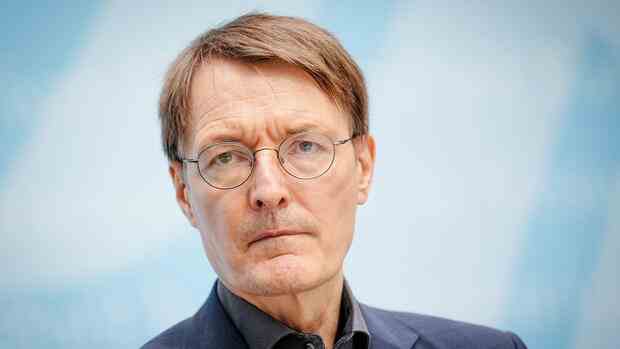Berlin The week was only a few hours old when Karl Lauterbach (SPD) said words last Monday that resonate to this day. Asked in the ARD morning magazine about mistakes in the corona pandemic, the Minister of Health mentioned the closed schools and daycare centers. But it wasn’t politics that was to blame – but science.
“Back then, science was in Germany: the schools had to be closed because there were transmissions,” said the SPD politician. The scientists would have advised the federal government.
Lauterbach’s statements are not isolated cases. Well-known SPD politicians keep lashing out at scientists. Shortly before Lauterbach, SPD faction leader Rolf Mützenich had dismissed security experts in the tank debate. And even Federal Chancellor Olaf Scholz (SPD) repeatedly draws attention to his severe criticism of economists.
This attitude towards science has a long tradition in the SPD. One example is the disparagement of the tax lawyer Paul Kirchhof, whom the former SPD chancellor Gerhard Schröder only described as “the professor from Heidelberg” in the 2005 federal election campaign.
Former SPD leader Sigmar Gabriel also regularly turned to economists. Shortly after taking office as Economics Minister in 2013, he appeared unannounced at a meeting of his ministry’s Scientific Advisory Board and told the top economists that he saw no reason why the board should not be dissolved immediately.
Scientists are outraged by the criticism
To this day, the SPD defines itself as a workers’ party, as the party of the “little man”. Attacks on parts of the academic elite therefore serve to demarcate politically: those up there, we down here. They there in their academic ivory tower, we here in reality. Those who theorize, we who solve real problems.
>> Read here: The red-green republic – how the governing parties get their own people into top jobs
But in the post-truth era, when politicians like former US President Donald Trump are questioning science, at a time when a pandemic has revealed the importance of science-based politics, the SPD’s stance on science in academia is becoming increasingly complex with even greater astonishment than before. Or just with horror. Such as the recent attack by SPD parliamentary group leader Mützenich.
After Chancellor Scholz’s decision to send German battle tanks to Ukraine, Mützenich wrote in a letter to his parliamentary group that “diplomatic negotiations are carried out confidentially and not in the media, involving alleged experts who are so numerous on talk shows not always give well-intentioned and well-considered advice”. And: “Every heckling, which is often uttered solely for self-portrayal, must be misinterpreted in Moscow.”
>> Read here: The tanks should roll – but over which roads and bridges?
Well-known security experts like Carlo Masala reacted coldly. “It’s one thing when Mützenich criticizes us, but to claim that we’re doing it for ego reasons and that we’re helping Moscow is under all guns,” he wrote on Twitter.
Claudia Major from the Science and Politics Foundation was also irritated. “Undifferentiated” insinuations and questioning of competence, just because experts do not represent the SPD line, are “an indictment of failure,” she also explained on Twitter.
Even the SPD chancellor, who is otherwise so level-headed, often falls out of character when he comes to the subject of economists. When well-known pension experts calculated in the 2021 election campaign what a risk of a contribution shock in the pension insurance system, Scholz said: “The proposals of this so-called expert committee are incorrectly calculated and antisocial.” He would like to talk to “real experts” about the topic. One of the experts he criticized was Martin Werding, one of the five economic wise men.
The sharp criticism was by no means due to the election campaign, Scholz continued in office as chancellor. A month after the outbreak of the Ukraine war, he attacked a group of well-known economists on the television program “Anne Will”, who had calculated a simulation of the consequences of an energy embargo. It is “irresponsible to add up any mathematical models that then don’t work,” explained Scholz.
SPD defends statements by Scholz and Lauterbach
The Chancellor’s statements are also surprising because after taking office in 2021 he set up a Corona expert council with 19 top-class scientists and had previously convened a Corona expert council of economists as Finance Minister.
Scientific associations do not want to comment on the criticism from the SPD. On request, the Leopoldina states: “As a matter of principle, the Leopoldina does not comment on political decisions or statements made by people.”
Wiebke Esdar, head of the SPD Science Forum, defends the criticism from within her own ranks: Scholz had “exercised technically justified criticism because important parameters were missing in the published calculations” on the gas embargo. Mützenich would have criticized the one-sided focus of the tank debate, Health Minister Lauterbach was himself a proven scientist. “We as the SPD use the scientific findings with great appreciation and high demands on the scientific work,” explained Esdar.
In science, however, the perception is different. After Mützenich’s criticism, security expert Masala wrote that the turning point was like the Corona period: “Simply making science stupid, it’s always well received.” As a consequence, Masala wished the SPD a lot of fun with “finding your experts for events soon “.
More: SPD is striving for Germany to play a leading role in foreign policy
